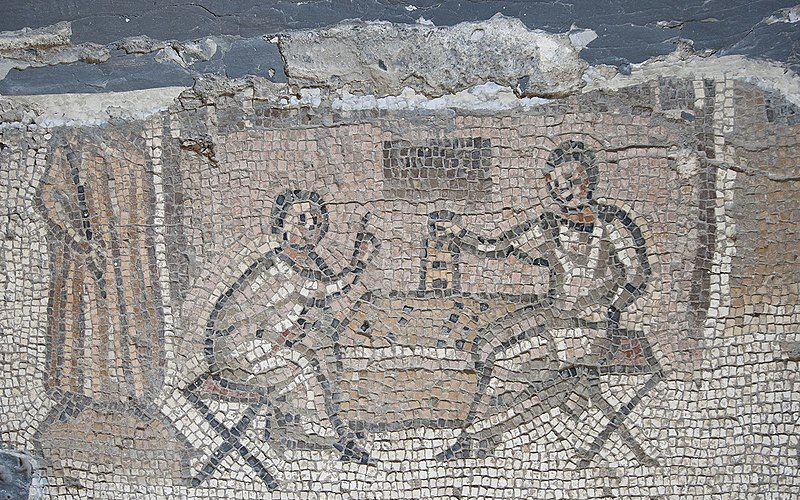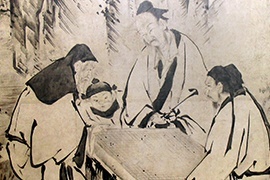Ancient Gambling
The History of Gambling
Today, gambling is a part of our every day lives, even for those that don’t directly take part in the pastime. From national lotteries to sprawling, 5 star casinos, gambling has become a staple of the modern age, and it would be understandable if you believed that gambling and sports betting was something that developed over the last 100 years.
Medieval gambling, the favourite pastime. There’s no doubt that gambling – on all sorts of games – was in the heart of a great many medieval lives. Even if you weren’t playing yourself, most of the people you knew were. Medieval gambling games, like dice, cards, and even board games, were the folly of many. Ancient Origins articles related to gambling in the sections of history, archaeology, human origins, unexplained, artifacts, ancient places and myths and legends. Gambling is one of humankind’s oldest activities. Dice in particular have drawn attention from scholars, and a recent study of dice reveals that truly balanced dice did not really exist until the Renaissance. How pre-Renaissance people viewed their games’ fairness is difficult to say, but dice themselves have a long and fascinating history.
India saw a number of games in ancient period ranging from the various dice games to other board games. The use of cubical and oblong dice was common in the Indus Valley Harappan civilization (c. Archaeological excavations have found gambling dice in monasteries and other Buddhist sites. The Popularity Of Gambling in Ancient Cultures Gambling goes back into the ancient times, there were ancient forms of gambling not Black Jack or Slot Machines that you see today. Mostly everyone in the Roman times gambled from nobility to regular citizens and even slaves liked to gamble and even play games.
The truth, however, is that gambling has been part of a number of ancient cultures, and was so popular that it even eclipses the widespread nature of today’s equivalent in some places. From ancient China to Northern Europe, gambling has been enjoyed by countless civilisations, and it’s one of the few pastimes that has survived war, collapse, and even time itself. The next time you’re online checking your AFL betting odds, just remember that gambling is almost as old as civilisation itself.

The Ancient Romans and Gambling
There are few other civilisations that saw the longevity of the ancient Romans, and while their culture underwent a multitude of changes, much of what the early Romans enjoyed remained the same for the next 2000 years. One of the most popular of all pastimes for the Romans was gambling, and it was one of the few that superseded class and wealth – everyone, from the slave to the emperor – found time to indulge in a little gambling as much as possible.
It was so important to them that gambling was part of times of celebrations, such as the festival of Saturnalia, which was held in December each year. The festival was a celebration of the god Saturn, who was the deity of Agriculture, and the festival was a time where laws and conventions of the time were turned upside down. This involved slaves dining as masters, and dice games were played on every corner.
Keep in mind that this was during the period of the Republic, where open gambling was prohibited, but does show how intrinsically linked the people were to the pastimes of their forefathers.
Daily Gambling
Despite the various prohibitions that were enforced by the government, daily gambling was still enjoyed, and was mostly played in taverns and other community places. There is even archaeological evidence that some gamblers would cheat to earn their fortunes – making use of loaded dice. Graffiti found in the preserved and famous city of Pompeii have the words; “I am skilled enough to win without cheating” shows that those that were able to win honestly thought themselves better than those that cheated.
Ancient Rome Gambling
Well-known Roman emperor, Augustus, was especially fond of gambling, and enjoyed playing during every festival that he could. No matter what laws came into place, and which eventually fell away, the Roman people could never shake their deep love of gambling. The notion of chance and luck was deeply rooted in their culture, and had links to life and death, and to the gods themselves. It’s also a pastime that has remained popular in Italy to this day.
Gambling in the UK is prolific and there are plenty of sites where you can gamble online, but the industry is also highly regulated and controlled. This is not shady, fly by night business.
Who regulates Online Gambling in the UK?
/GettyImages-685023099-12f8d13ae0f8434a99f09a56d4e598ba.jpg)
Online gambling in the UK is regulated under the 2005 Gambling Act (amended in 2014) that allows for the legal provision of certain forms of interactive betting, including online sports betting, casino games, and bingo, provided that players are over the age of 18. Since then, many new casinos have established themselves in the UK.
The UK Gambling Commission has jurisdiction over the entire gambling industry in the UK. It is there to prevent players from being taken advantage of by unscrupulous operators as well as unfair terms, practices and wagering requirements. Since the beginning of 2020, the self-exclusion scheme Gamstop is mandatory for UK-licensed gambling sites. The casinos which are not included on Gamstop are illegal if they are directed to UK gamblers. Most of these casinos are directed to a European customer, but open to UK players. That makes them still legal. The same logic occurs to betting sites not on Gamstop.
Ancient Gambling Acts and Laws
Gambling is as old as time and while the current Gambling Act was introduced in 2005, there have been laws governing gambling in the UK for centuries. In 1190, King Richard I of England created the first known gambling laws, outlining who would be allowed to gamble and how much they could wager.
In 1509 gambling was banned in England by King Henry VIII. But under the reign on his daughter, Queen Elizabeth I, the first gaming act in the UK was passed by parliament and the first state lottery was held in England on 11 January 1569.
The main jackpot was £5 000 but every person who bought a ticket won a prize. The lottery was designed to raise money for the royal coffers so that England could shore up its ailing coastal defences.
In 1612 King James I created a lottery to raise funds for Jamestown, Virginia, the first permanent British settlement in North America. By 1760 betting on the horses had become a popular pastime among the aristocracy and the government turned a blind eye to their activities, but it was still a criminal act that was enforced among the lower classes.
In 1739 and 1745 Gaming Acts were introduced that banned wagers on a wide variety of pub games, including darts and roulette.
The Betting and Gaming Act 1960 and Beyond

Ancient Gambling Games
Prior to 1960, betting in the UK was still subject to archaic and outdated laws. But that all changed with a British Act of Parliament, passed on 1 September 1960, which legalised certain forms of gambling, allowing for the wager of small sums of money in games of skill such as bridge.
Ancient Roman Gambling
In May 1961 betting shops were allowed to open and gambling has flourished in Britain ever since. The Gambling Act 2005 now controls all forms of gambling in the UK and transferred the authority for the issuing of gambling licences from magistrates courts to local authorities as well as creating the Gambling Commission.